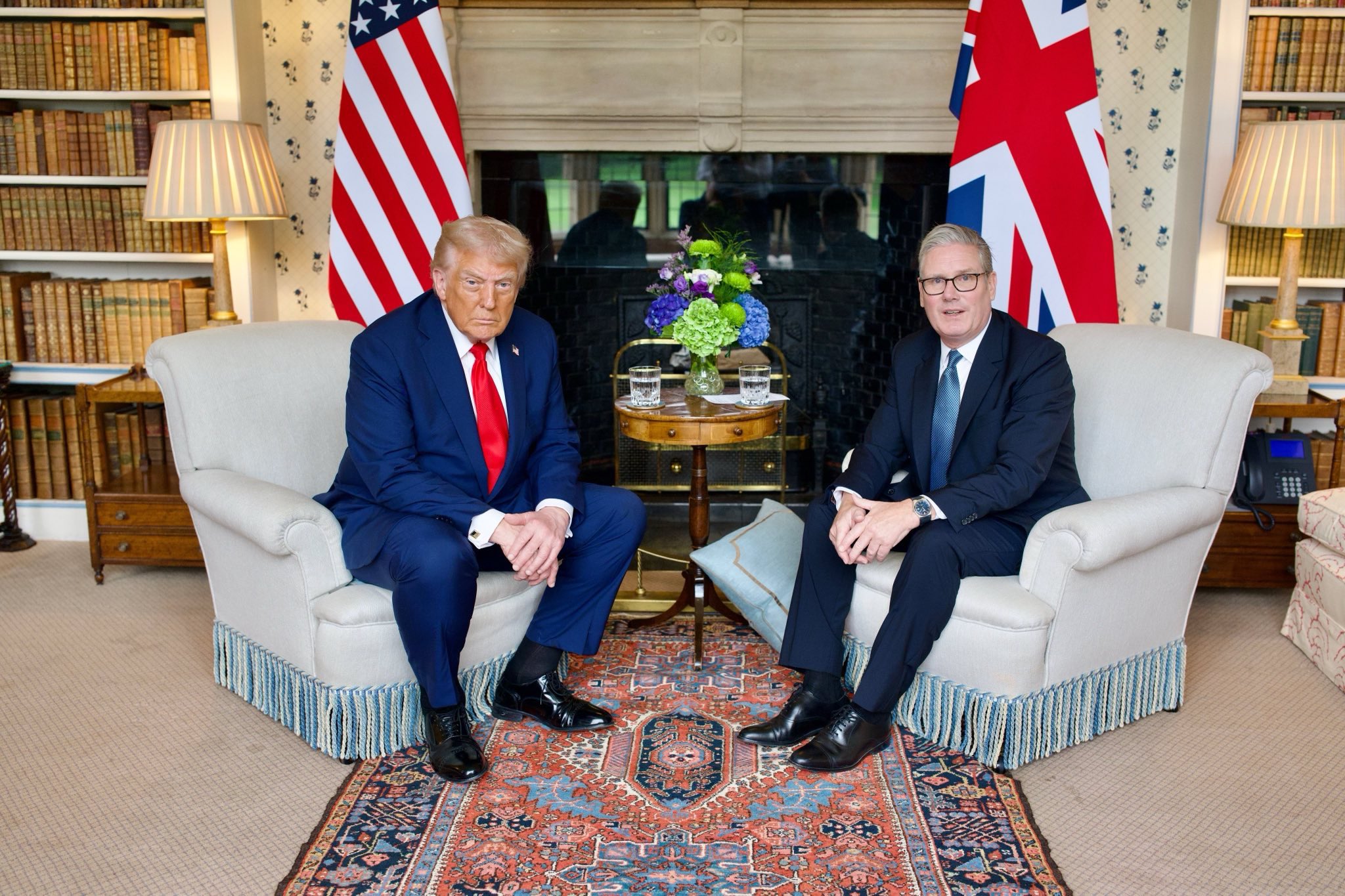Good Evening,
The U.S. and U.K. just shook hands on a landmark tech deal, covering AI, quantum computing, and fusion energy, proving that transatlantic teamwork is still a thing.
Meanwhile, Nvidia pours $5B into Intel, Meta shows off glasses that might make you feel like a superhero, and Britain gets ready to build military aircraft for the U.S.
All that and more.. let us dive in!
DRIVING THE CONVERSATION TODAY
The Technology Prosperity Deal
On September 18, 2025, the United States and United Kingdom formalized the Technology Prosperity Deal, a broad memorandum of understanding aimed at deepening collaboration on next-generation technologies.
The non-binding pact focuses on AI, civil nuclear, fusion, and quantum computing, establishing joint research programs across agencies like DOE, NSF, NIH, UKRI, and DSIT. Key priorities include AI for medical breakthroughs, fusion energy development, space exploration, and pro-innovation AI policy frameworks, alongside the promotion of transatlantic AI exports.
The deal also targets advanced nuclear and fusion technologies, with goals including streamlining licensing, securing independent fuel supplies by 2028, and developing global markets for U.S. and U.K. standards. In quantum, the partners will launch benchmarking initiatives, coding challenges, and joint centers of excellence to accelerate algorithm and sensing technology development. Additional cooperation covers research security, 6G, critical infrastructure, and investment in frontier technologies.
A Ministerial-Level Working Group will convene within six months to guide implementation, with annual reviews to assess progress. The MOU is explicitly non-binding, allowing either country to withdraw with 180 days’ notice, but marks a significant step toward a coordinated U.S.–U.K. strategy to secure global leadership in strategic science and technology.
British teen charged in $115M Cybercrime spree
U.S. prosecutors on Thursday unsealed federal charges against 19-year-old British national Thalha Jubair, accusing him of orchestrating more than 120 cyberattacks, including hacks on the U.S. Courts system and dozens of American companies, that netted over $115 million in ransom payments.
Jubair was arrested in East London on Tuesday alongside 18-year-old Owen Flowers, both linked to a 2024 Transport for London breach attributed to the notorious Scattered Spider hacking group. Prosecutors allege Jubair used social engineering tactics, such as impersonating employees to gain IT access, before stealing data, encrypting servers, and extorting victims.
Evidence seized from servers tied to Jubair reportedly includes data from a New Jersey critical infrastructure company, access to a federal magistrate judge’s account, and a crypto wallet holding $36 million in illicit funds.
Scattered Spider, dubbed “advanced persistent teenagers” for their repeated attacks, is also tied to the broader cybercrime collective “the Com,” known for online and physical threats. Jubair faces hacking, extortion, and money laundering charges in New Jersey, but it remains unclear whether U.S. authorities will seek his extradition.
Google partners with StopNCII against revenge porn
Google has joined forces with U.K.-based nonprofit StopNCII to step up its fight against nonconsensual intimate images, or revenge porn, by integrating the group’s hash-matching technology into its search engine.
StopNCII allows adults to create digital fingerprints of private images directly from their devices, ensuring the images themselves never leave personal control; these hashes are then used by partner platforms to automatically detect and remove matching content.
While Google already lets users request takedowns of such material and has tweaked search rankings to limit visibility, the company said survivors and advocates have stressed the need for broader protections given the size of the web.
The move comes a year after Microsoft added StopNCII’s tool to Bing and brings Google in line with other partners like Meta, TikTok, Reddit, and Snapchat. It also follows Google’s recent measures to make deepfake intimate images easier to remove and harder to find on Search.
Meta launches Ray-Ban Display glasses
Meta unveiled its first consumer smart glasses with a built-in display on Wednesday, pitching them as a step toward “superintelligence” even as analysts warned the $799 price tag could deter buyers.
CEO Mark Zuckerberg introduced the Meta Ray-Ban Display at the company’s Connect conference in Menlo Park, showing off features like notifications projected in the lens and a wristband that translates hand gestures into commands.
Meta also launched Oakley-branded $499 sports glasses and refreshed its cheaper Ray-Ban line, while positioning the Display as a precursor to its more advanced “Orion” glasses due in 2027.
FUNDING FLASH
Nvidia invests $5B in Intel
Nvidia announced a $5 billion investment in Intel on Thursday, becoming one of its largest shareholders with a 4% stake and giving the struggling U.S. chipmaker a major boost after years of failed turnaround efforts. The deal, which follows the White House’s earlier move to secure a 10% government stake in Intel, sent Intel’s shares soaring 23%.
Nvidia and Intel will jointly develop PC and data center chips, with Intel supplying central processors and advanced packaging but not manufacturing Nvidia’s GPUs. Analysts see the pact as a possible lifeline, or precursor to a breakup, for Intel, while also posing risks to rivals AMD, Broadcom, and particularly Taiwan’s TSMC, which currently makes Nvidia’s flagship processors. Nvidia CEO Jensen Huang stressed the deal was independent of the Trump administration, though he met the president in London the same day.
Conduct – $12M Seed
London-based startup Conduct has emerged from stealth with a $12 million seed round led by Creandum, joined by Lucid Capital, Booom, and angels from Palantir, Google DeepMind, and SAP, to take on the problem of outdated enterprise resource planning (ERP) systems.
Founded last year by ex-Palantir engineers Jan Philipp Haas, Philipp Hoefer, and Henry Thompson, Conduct uses agentic AI to untangle the complex, heavily customized legacy platforms, particularly SAP, that underpin most Fortune 500 firms.
The company’s platform lets enterprises directly interrogate and manage their ERP environments, revealing buried business logic and cutting operational costs by up to 90% in early pilots with Daimler Truck and Rittal.
EHE Ventures – £1.1M AI Fund
Manchester-based venture capital firm EHE Ventures has invested over £1.1 million in a portfolio of early-stage AI startups through its new SEIS AI Growth Fund, part of the UK government’s Seed Enterprise Investment Scheme.
The funding targets companies developing AI solutions for real-world applications across health, agriculture, publishing, fintech, and consumer tech, including startups like SUBJCT, Fotenix, Spotlight Pathology, Good With, Peppercorn AI, NeuWave Technologies, and Scooch.
In addition to capital, the startups will receive hands-on support and guidance from EHE’s internal Venture Studio, helping them refine products, scale technology, and accelerate market entry.
Octopus Energy – Kraken spin-off
Octopus Energy is spinning off its AI-powered energy platform, Kraken, into a standalone company, reflecting its growth from an internal tool to a major revenue driver. Kraken, which automates much of the energy supply chain, has generated $500 million in committed annual revenue through licensing deals with energy firms including EDF, E.ON Next, and National Grid US, quadrupling revenue in three years.
The new company will be led by CEO Amir Orad, who has overseen Kraken since July 2024, with Tim Wan joining as CFO from Asana. Octopus founder Greg Jackson praised Kraken’s global success, while Orad highlighted the spin-off will allow the platform to expand, serve clients equally, and accelerate the energy transition through advanced AI and utility-grade cloud technology.
INTERESTING, BUT STILL COOKING
DJI Mini 5 Pro
DJI has launched the Mini 5 Pro, a sub-250g drone that packs a major camera upgrade with a 50-megapixel, 1-inch CMOS sensor, its first in this weight class, aimed at delivering high-quality imaging even in low light.
Priced from €799, the Mini 5 Pro also offers 4K/60fps HDR video, 4K/120fps slow motion, a new 48mm Med-Tele mode, and features like true vertical shooting and 225° roll rotation for creative shots.
Flight performance gets a boost too, with speeds up to 65 km/h, a climb rate of 10 m/s, and a 36-minute flight time on its 2,788mAh battery, extendable to 52 minutes with the larger Flight Battery Plus (not available in Europe due to weight restrictions).
Microsoft Gaming Copilot AI
Microsoft is expanding its Gaming Copilot AI assistant to Windows PCs and the Xbox mobile app, following beta testing with Xbox Insiders. Available to players aged 18 and over, the AI appears as an on-screen overlay that provides game tips, account information, and purchase recommendations, using in-game screenshots to understand player activity.
The PC version includes a “Push to Talk” hotkey, while the mobile app for Android and iOS, rolling out in October, features a microphone button for voice interaction. Microsoft encourages user feedback to refine the tool and plans future integration with its Xbox Ally handheld consoles, launching October 16. The assistant will be available globally, except in mainland China.
Deliveroo founder Will Shu set to step down
Deliveroo founder Will Shu will exit the company after its £2.9 billion acquisition by U.S. rival DoorDash is completed, with the deal expected to be finalised by October 2nd pending court approval.
Shu, who launched Deliveroo in 2013 and grew it into a nationwide food delivery leader, is set to earn over £170 million from the sale of his stake. Several other executives, including non-executive directors Claudia Arney, Peter Jackson, and Dominique Reiniche, also plan to leave following the takeover.
Shu described his departure as a chance to reflect on his next challenge, noting that Deliveroo’s growth and profitability are accelerating as the company continues its mission to transform food delivery.
EQUALLY IMPORTANT
UK to build E-7A Wedgetail military aircraft for U.S.
The UK is set to build military aircraft for the U.S. Air Force for the first time in over fifty years, following a new contract with Boeing that will create more than 150 jobs in Birmingham and support another 190 across the country.
The deal involves converting two Boeing 737 passenger aircraft into advanced E-7A Wedgetail early-warning surveillance prototypes, adding over £36 million to the UK economy and strengthening Britain’s defence industrial base.The E-7 Wedgetail, already part of the UK’s defence plans, uses radar and sensors to detect threats up to 300 miles away and will enter service with the RAF in 2026.
The contract also involves more than 40 UK suppliers, the construction of new engineering facilities at RAF Lossiemouth, and coordination with U.S. firms, enhancing both national security and the transatlantic defence partnership.
Defense Secretary John Healey described the project as a “vote of confidence” in the UK’s world-leading defence industry and a boost for skills and jobs nationwide.
Former Meta lobbyist Niamh Sweeney named head of EU’s Facebook regulator
Niamh Sweeney, a former Meta lobbyist and former director of European public policy at WhatsApp, has been appointed commissioner of the Irish Data Protection Commission (DPC), the EU’s key regulator for big tech.
She joins existing commissioners Des Hogan and Dale Sutherland to oversee the body responsible for enforcing data protection laws like the GDPR. Sweeney’s appointment has drawn attention because the DPC has a reputation for leniency toward tech giants, collecting just 0.6% of fines levied and facing criticism for under-enforcing regulations, including against Meta itself, which faced fines totaling nearly $400 million for data breaches and password storage violations. Ireland’s Justice Minister Jim O’Callaghan welcomed the expansion of the commission, highlighting its growing responsibilities.
DMA at risk: Vague rules, Legal blowback
A new report commissioned by the Computer & Communications Industry Association (CCIA Europe) argues that the EU’s flagship Digital Markets Act (DMA) is riddled with flaws that could render it unenforceable and even vulnerable to being struck down in court.
The study, conducted by law firm King & Spalding, criticizes the DMA’s “clunky procedures,” vague language, and reliance on the European Commission’s shifting discretion, warning that these issues create legal uncertainty for both tech “gatekeepers” and rivals seeking access under the law. It also highlights burdensome deadlines and opaque arbitration processes, which it says make compliance a “guessing game.”
While CCIA, which represents major tech firms long critical of the DMA, maintains its members are committed to following EU law, it is calling for reforms ahead of the legislation’s 2026 review, including automatic approval of compliance if the Commission fails to act in time.
The lobby group frames the study as a constructive roadmap, though it underscores growing tensions between Brussels regulators and the companies the law was designed to rein in.












